Brazil battles to be ready for 2014 World Cup
- Published
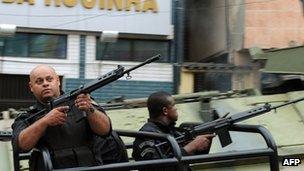
The military action in Rio's shanty towns has gained widespread global coverage
From a corruption scandal to heavily armed troops storming shanty towns, Brazil's recent preparations for hosting the 2014 World Cup have not exactly bathed the country in a positive light.
For a nation so synonymous with football, Brazil's work ahead of the next World Cup was always going to be of global interest.
Add the former sports minister resigning amid allegations of multi-million dollar kickbacks, and marines taking control of favelas or shanty towns in Rio de Janeiro with the support of tanks and helicopter gunships, and Brazil has certainly garnered some negative headlines around the world.
And that is before you consider that Fifa, the governing body of world football, continues to express its concern that Brazil is behind schedule on both stadium construction and the required wider infrastructure improvements.
Yet with a new sports minister in place - a politician considered to be spotlessly honest and competent - and the efforts to bring law and order to Rio's favelas winning widespread praise in the Brazilian media, the country is now surprisingly upbeat about efforts ahead of 2014.
With numerous Brazilian officials attending the Soccerex Global Convention of football business and finance - that is being held in Rio de Janeiro this week for the second year running - the mood is a positive one.
Fifa concern
But back in October things were far less rosy.
Amid growing pressure for his departure, Sports Minister Orlando Silva stood down, accused of misappropriating more than $20m (£13m) from a fund to promote sport for deprived children.
Mr Silva, who was leading preparations for both the World Cup and Rio's hosting of the summer Olympics in 2016, strongly denied the allegations, calling his main accuser a "delinquent".
The fifth Brazilian cabinet minister to leave office this year amid corruption allegations, he said he was standing down to enable him to "defend my honour".
Mr Silva's departure increased the volume of the already ringing alarm bells at Fifa.
However, Brazilian President Dilma Rousseff was quick to act, appointing Aldo Rebelo as the country's new sports minister.
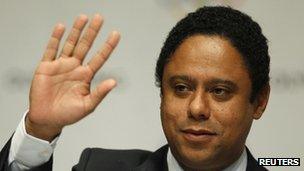
Orlando Silva denies any wrongdoing
Mr Rebelo, who like Mr Silva is a member of Brazil's Communist Party, is seen as a safe pair of hands.
David Fleischer, professor of political science at the University of Brasilia, says: "Mr Rebelo is a very well respected and honest politician.
"The first thing he did was rip up all existing [sporting] contracts with NGOs [non-government organisations].
"As you know there are a lot of allegations of corruption in Brazilian football, and in Fifa it has to be said, but Mr Rebelo is a fresh start.
"The Brazilian people are always optimistic, and they are certainly optimistic that everything will be ready for the World Cup in spite of any adverse conditions."
Fifa though still needs to be convinced.
In testimony to a Brazilian parliamentary committee earlier this month, Fifa general secretary Jerome Valcke said Brazil was "late, we cannot lose one more day".
Mr Valcke added that driving across Brazilian cities was a "nightmare" and that leaving the country's airports "takes half a day".
Mr Rebelo and his colleagues still have a lot of work to do at the 12 World Cup host cities.
Favelas control
Yet for all the reports of Mr Silva's departure and stadium delays, it has inevitably been the recent military operations in Rio's favelas that have dominated coverage of Brazil in the global media.
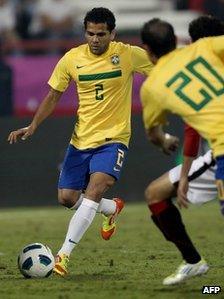
Brazil hosts the World Cup for the second time in 2014
When you consider the scale of these actions, it is not surprising.
In a recent occupation or "pacification" of the Rocinha favela, one of the largest in Rio, 3,000 marines and armed police officers took part.
The aim of the operations is to regain control of the favelas from Rio's drug gangs.
In a marked contrast to the "arrest and then pull out" tactics of the past, the police are now establishing a permanent presence in the shanty towns.
The hope is that this will prevent the gangs from re-establishing themselves, and lead to an improved quality of life for the residents.
The police authorities are targeting the 40 favelas closest to facilities that will be used in the World Cup and 2016 Olympics.
And so far the scheme has been a success, with the "shock of peace" tactic of maximum police and marine numbers meeting little or no resistance from the drug gangs.
Yet with Rio having more than 600 favelas sprawling across hillsides all over the city, home to 1.5 million people - a third of the city's population - the concern of some commentators is that the drug gangs, and their associated violent crime, will simply move on to a new location.
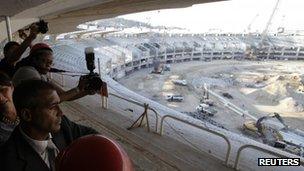
Construction work is continuing at the 12 stadiums that will hold World Cup games
Marcelo Pedrosa, director of international markets at Embratur, the Brazilian Tourist Board, says that fear of crime should not be a concern for overseas visitors to Rio.
"It is distant perception, but not the real experience," he says.
"For example, during the riots in London back in the summer, the perception around the world was that no-one left their home because of their fear. But obviously that was not the case."
Marco Antonio de Britto Lomanto, Embartur's director of products and destinations, adds that the pacification work in the favelas shows just how seriously Brazil takes its security preparations ahead of the World Cup.
'Tremendous opportunities'
Back on Copacabana Beach, where the movers and shakers from the world of football business and finance are gathering for the Soccerex Global Convention at Rio's Forte de Copacabana exhibition and conference centre, the focus is on how much the World Cup will benefit Brazil.
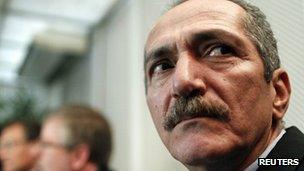
Brazil's new Sports Minister Aldo Rebelo is said to be a very safe pair of hands
Soccerex chief executive Duncan Revie says: "Rio is such an exciting city, and there is a real sense now of the possibilities the World Cup will bring not just to Rio but to the whole of Brazil.
"As the preparations intensify, so does the need for expertise and the interest in the event's business potential - it feels like the perfect time to be bringing Brazil together with businesses and decision-makers from the world market."
With representatives from football teams and sports-related companies from around the world in attendance, such as management agencies, stadium-builders, sponsors and sportswear manufacturers, Soccerex is seen as the place to network and agree deals.
One British firm in attendance is Travel Places, which specialises in getting sporting teams to games or events around the world.
Dave Freeman, senior manager at Travel Places, says: "Being in Rio gives us a chance to better understand the complexities of the city and get a head start on our opposition.
"Brazil is such a football-made country, the opportunities are tremendous."
The country just needs to be ready on time.